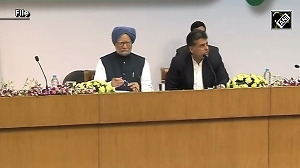 Doing some plain-speaking, Governor Raghuram Rajan on Tuesday said RBI is not a 'cheerleader' and he may have "erred a bit" in lowering the policy rate to push investments as growth was not happening at the ground level.
Doing some plain-speaking, Governor Raghuram Rajan on Tuesday said RBI is not a 'cheerleader' and he may have "erred a bit" in lowering the policy rate to push investments as growth was not happening at the ground level.
He said GDP growth might be weaker than what the headline number suggested and questioned why an economy needed rate cut when it was growing at 7.5 per cent.
There is a "contradiction" in the higher GDP growth numbers and poor corporate earnings while there was no visible pick-up in the consumer demand, he added.
"In some sense it is a Goldilocks policy, just right given the current situation," Rajan said, while defending his third 0.25 per cent rate cut this year despite lingering concerns over the below-normal monsoons as well as steadily firming oil prices and their impact on inflation.
After two off-policy rate cuts of 0.25 per cent each since January, Rajan today reduced the short-term lending rates by 25 basis points to 7.25 per cent.
"The RBI is not a cheer leader. Our job is to give people confidence in the value of the rupee, in the prospects of inflation, and having established that confidence, create a longer-term framework for good decisions to be made.
"Every time an exporter comes to me and says that stability has been very valuable for us to make decisions, that reinforces my view that these our main role is not to act as cheer leaders," Rajan told reporters here at the customary post-policy press briefing.
His response came on a query as to why RBI chose a moderate 25 bps cut and not a "booster-dose of 50 basis points".
However, he added that he might have erred a bit to push investments in spite of higher headline growth numbers, as investments been stalled for many quarters now.
"In fact, we have sort of erred a little bit on focusing on encouraging investment, given the need to alleviate medium- term supply constraints," Rajan said, adding however that recent corporate earnings confirm that at the ground level growth is not happening nor there is any visible pick-up in the end user demand.
He termed today's policy move as neither conservative nor aggressive, but based on the current data available and underlined that "going forward, as in the past, our policy steps will be data contingent".
He also denied being under government pressure for cutting the rates, saying the decision was purely based on available data.










 © 2024 Rediff.com -
© 2024 Rediff.com -